AI Literacy Week continued with two powerful sessions that grounded educators in both the classroom strategies and the family partnerships needed to help students thrive in an AI-driven world.
Session 1 featured host Farmer Faubs with guest Brittany Blackwell from Class Companion. Together they showed how to introduce AI literacy in ways that are simple, structured, and supportive for teachers and students.
Session 2 was hosted by David Hotler with guest Yaritza Villalba. Their conversation highlighted how to extend AI literacy beyond the classroom by engaging families and centering culturally responsive practices.
Grab all slides, templates, and examples in one place →
Building Classroom Foundations with Class Companion
Guests: Brittany Blackwell, Class Companion | Hosts: Farmer Faubs
The kickoff session set the tone: AI literacy isn’t about chasing the latest tool. It’s about helping students understand how AI works, what it can and can’t do, and how to use it responsibly.
Farmer Faubs demonstrated how Book Creator’s What is AI? resource and Class Companion can give teachers a simple entry point:
- AI Literacy ≠ just tools. Students explore how AI works, where it helps, where it fails, and how to handle bias, privacy, and attribution.
- Human in the loop. A “70/30 mindset” keeps AI as a thought partner, not a replacement.
- Practical assignments. Students remix the What is AI? book, add examples of everyday AI, and reflect using text, audio, or video.
- Integrity with flexibility. Class Companion’s “response integrity” flags copy/paste work but prompts dialogue, not punishment. Students can even rebut AI feedback to keep their voice in the process.
For hesitant teachers, Brittany recommended starting small: use AI for rubric drafts, exemplar responses, or reading-level adjustments—time-savers that let teachers focus more on student thinking.
👉 Try it now: Remix the What is AI? book into your library and run the activity in one class period. Then take Class Companion's AI Course for Educators.
Extending AI Literacy with families
Guest: Yaritza Villalba | Hosts: David Hotler
While the first session focused on classroom strategies, this conversation highlighted the importance of families in AI literacy. As Yaritza reminded us: not every student starts from the same place. Equitable AI education means partnering with families, recognizing diverse experiences, and making conversations culturally responsive.
Key takeaways from Yaritza’s session:
- Meet families where they are. Explain AI using everyday examples—GPS, video recommendations, smart assistants—to lower the barrier.
- Model skepticism. Teach students and families to ask: Is this true? Where did it come from? What might be biased?
- Anchor in digital citizenship. Privacy, ethics, and inclusivity should drive both classroom and family conversations.
- Give families tools. Use Book Creator activities like “AI Vocabulary Match” and “AI in My Life” to spark meaningful discussions at home.
Yaritza also shared remix-ready activities educators can send home:
- Family AI Discussion Guides with prompts like What should AI never be allowed to do?
- Create an AI Code of Ethics together as a family.
- Design an AI That Helps Everyone, focusing on equity and authentic community needs.
Do this next: Assign the AI in My Life reflection page to students and send home the Family Discussion Guide. Both are inside the AI Literacy Week Notebook.
The Big Takeaway
Across both sessions, a consistent theme emerged: AI is here now, and equity depends on how we teach it. For teachers and students, it’s about starting with accessible activities and designing assignments AI can’t simply do for them. For families, it’s about honest conversations, building trust, and ensuring every child learns to use AI as a responsible, creative thought partner.
.👉 Get every resource mentioned—from classroom templates to family discussion guides—inside the AI Literacy Week Notebook.

Get Book Creator for your school!
- Upgraded accounts for all your teachers
- Implementation plan to help with rollout
- PD support
- Analytics & admin dashboard
With 20 years of experience in education, Katie is passionate about creating inclusive and accessible classrooms for all students. She loves exploring new places, trying different foods, and connecting with fellow educators.



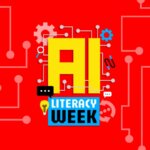
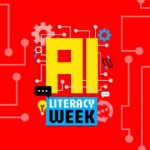
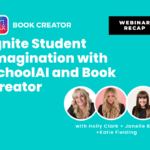

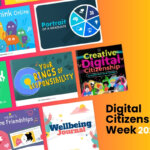

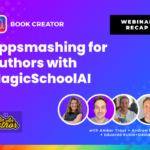

One Comment on “How to Teach AI Literacy: Classroom Activities and Family Guides from AI Literacy Week”
This article provides excellent, practical strategies for integrating AI literacy into classrooms and engaging families. The emphasis on responsible use and equity is particularly insightful. Highly valuable for educators!